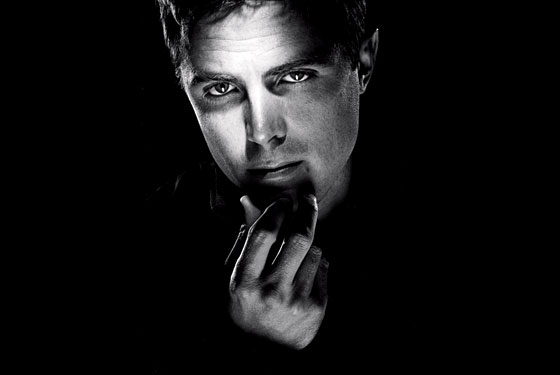
Casey Affleck is not the Nanny-Shagging Fop, the Bongo-Bopping Jock, the Eternally Rehabbing Genius, the Square-Jawed Humanitarian, or the Nice-Guy Action Star. So far, he’s avoided being typed. “I don’t think journalists have much impression of me,” he says. “I haven’t really done all that many interviews, partly by choice, and partly because no one’s been all that interested,” he adds, voice not-quite-cracking as usual. “Now things are getting different.”
Until this fall, the tag Ben Affleck’s Kid Brother has sufficed, but that won’t stick for long—not after the performances he delivers in The Assassination of Jesse James by the Coward Robert Ford (opening this week) and Gone Baby Gone, the directorial debut of his big brother (October 19). Very soon, maybe this Oscar season, Casey, 32, is going to be a star. He might even get his own tabloid caricature, whether he likes it or not.
In Andrew Dominik’s long-delayed, divisive Western The Assassination of Jesse James—which trades gunplay for what star Brad Pitt calls a “psychological drama”—Casey Affleck is Ford, and he plays the 19-year-old who courted and then killed his hero as a bundle of inept, frustrated energy: a broken-down car with a big, whinnying engine that can never quite shift into gear. “He was always heartbreaking,” says Affleck. In the Ron Hansen novel upon which the film is based, “it says that the light went out of his eyes before he could find the right words.”
When Ford pitches himself to James’s older brother (Sam Shepard), desperate to join the outlaws’ posse, his voice wheezes and whistles like a punctured accordion. “I have a lot of qualities that don’t come shining through right at the outset,” he says to his feet, in love with the sound of his own voice, just not confident enough to let everyone else hear it.
In Ben’s adaptation of the gruff Dennis Lehane crime novel, Gone Baby Gone, set in lower-class Boston, Casey is no trembling, pent-up sidekick. He plays his first tough leading man: a private eye who busts heads and tracks down a missing child. It’s miles away from anything else he’s done; his brother had to push him to take the part. “I kept coming up with these excuses and then I realized that I was sort of nervous about how we’d work together,” says Casey. “On set, we’d have big fights and then five minutes later be working really well—it was like when we were kids, yelling, ‘That’s my Stormtrooper,’ and five minutes later it’s like nothing ever happened.”
The novel’s detective is a classic dime-store hero, but Casey positions him against the grain. “He is defensive and cynical and a little angry. I never tried to play him as anything tougher than the third or fourth toughest guy on the block.” If Assassination is a showcase for Affleck’s skills, Gone Baby Gone is his Hollywood calling card. Of course, Affleck would never see it that way.
It’s easy to imagine why he might have conflicted feelings about all this. He worked on his first film, 1995’s To Die For, with Gus Van Sant and his now-brother-in-law Joaquin Phoenix (Affleck and Summer Phoenix are expecting their second child) while the press was still exploiting the death of River Phoenix. Then he watched his brother rise and fall. And then he saw pal Matt Damon become the biggest star of them all, by telling anyone who will listen that he’s not going to say anything interesting.
Whoever wrote anything like that is an idiot. Worry about your own family.
Ask Affleck about celebrity and he falls into his default mode, halfheartedly proposing one theory (“the supposed evils of celebrity culture or whatever are pretty obvious”) and then backing down from it (“or maybe not so obvious”) and finally mumbling that he doesn’t know what he’s talking about, anyway. Like this: “That was kind of what interested me: what people actually knew about Jesse James compared to who he really was. But it wasn’t a big part of what I was thinking about … I don’t know.”
Dominik recently said that Affleck nailed his part, to some extent, because he “knows what it’s like to live in somebody’s shadow.” But Affleck says he was intrigued by the way Ford “kept making mistakes,” and the way he grew up “reading comic books about Jesse James, written by people who didn’t know anything about him.” He pushes the point he’d stepped away from before. “They didn’t have a cousin who had been killed by him. They had never been robbed by him on the train. So when James was killed, a lot of people just saw it as another chapter in one of these nickel books they were reading.”
I tell him this sounds like he’s talking about his friends and the media, and he agrees: “A few people I know are nothing like they’re made out to be.”
So I ask him about a story that implied that he and his brother had drifted apart before Gone Baby Gone. “Whoever wrote anything like that is an idiot,” he says, finally coming down firmly. “I love reading about filmmakers, but I am not interested in fictionalization of their personal lives. Worry about your own family. I pay those suckers no mind.”
Last week in France, where Gone Baby Gone got great reviews, Ben Affleck was certainly in his kid brother’s corner. “This is the autumn of Casey Affleck,” he announced. “His career is really going to blow up.” It almost sounded ominous.
SEE ALSO: Casey Affleck’s Career Timeline